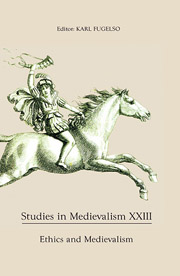Book contents
- Frontmatter
- Acknowledgments
- Contents
- List of Illustrations
- Epigraph
- Editorial Note
- I Ethics and Medievalism: Some Perspective(s)
- The Dangers of the Search for Authenticity? The Ethics of Hallowe'en
- Living Memory and the Long Dead: The Ethics of Laughing at the Middle Ages
- Justice Human and Divine: Ethics in Margaret Frazer's Medievalist Dame Frevisse Series
- The Song Remains the Same: Crossing Intersections to Create an Ethical World via an Adaptation of Everyman for Everyone
- Bringing Elsewhere Home: A Song of Ice and Fire's Ethics of Disability
- The Ethical Movement of Daenerys Targaryen
- II Interpretations
- Contributors
- Previously published volumes
The Ethical Movement of Daenerys Targaryen
from I - Ethics and Medievalism: Some Perspective(s)
Published online by Cambridge University Press: 05 May 2014
- Frontmatter
- Acknowledgments
- Contents
- List of Illustrations
- Epigraph
- Editorial Note
- I Ethics and Medievalism: Some Perspective(s)
- The Dangers of the Search for Authenticity? The Ethics of Hallowe'en
- Living Memory and the Long Dead: The Ethics of Laughing at the Middle Ages
- Justice Human and Divine: Ethics in Margaret Frazer's Medievalist Dame Frevisse Series
- The Song Remains the Same: Crossing Intersections to Create an Ethical World via an Adaptation of Everyman for Everyone
- Bringing Elsewhere Home: A Song of Ice and Fire's Ethics of Disability
- The Ethical Movement of Daenerys Targaryen
- II Interpretations
- Contributors
- Previously published volumes
Summary
George R. R. Martin's A Song of Ice and Fire suggests that attaining power often involves utilizing a politics that does not answer to ethics. While in Westeros, the setting for much of Martin's saga — and most specifically while in the seat of power itself, the capital city, King's Landing — we see that power is wielded by the one who is most willing to be treacherous. Or, as the character Ser Jorah Mormont formulates it, those most willing to play “the game of thrones.” As philosopher Marcus Schulzke points out, “the War of the Five Kings follows the logic of the Machiavellian struggle for power and illustrates many of Machiavelli's most important lessons.” The logic of this main battle in the books, called the “War of the Five Kings,” reduces the life of those who are not in power or fighting for power to a position of “bare life.” As ecologist Mick Smith argues, “the bios politicos cannot be simply a matter of an individual's capacity to survive or not: it is not reducible to bare life; rather it has to do with having the potential to initiate, participate in, and sustain politics as such.” Smith's argument is prescient for the citizens of Westeros, who, caught in the power struggle between the Five Armies, are reduced to just such a state of survival. While the battle is going on in Westeros, Martin introduces us to another continent on the other side of what is called the Narrow Sea.
- Type
- Chapter
- Information
- Studies in Medievalism XXIIIEthics and Medievalism, pp. 61 - 68Publisher: Boydell & BrewerPrint publication year: 2014



